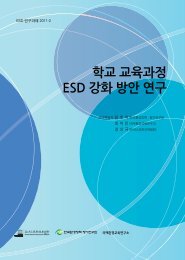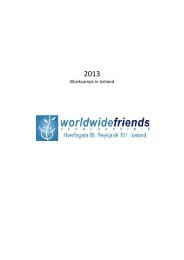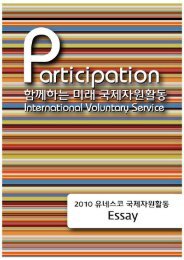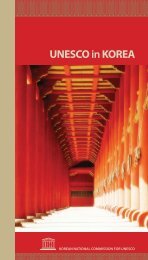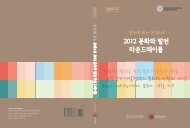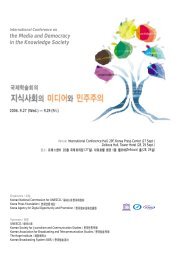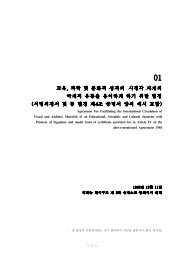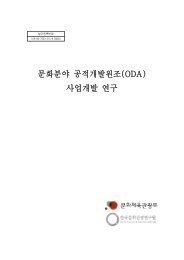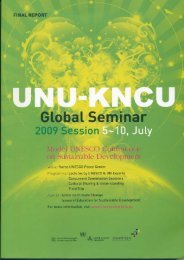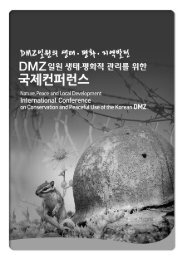Untitled
Untitled
Untitled
You also want an ePaper? Increase the reach of your titles
YUMPU automatically turns print PDFs into web optimized ePapers that Google loves.
acquisition. 12<br />
Based on these understandings, a new curricula design of arts education for<br />
sustainable thinking should incorporate the above-mentioned principles and<br />
standards. Those kinds of curricula can be suggested as follows: 1) Smart by nature<br />
programs that use nature as a context in arts education, 2) Artists in school<br />
programs that bring artists to teach in schools and 3) service learning programs that<br />
utilize local community resources in the learning process.<br />
VI. Epilogue<br />
The principles of ‘sustainability,’ which originated from an ecological point of<br />
view, have expanded its influence to all dimensions of society. As a result,<br />
‘sustainability’ has elevated into a core value that should be incorporated into all<br />
lines of education including arts education.<br />
Confronted with internal and external demands, arts education has<br />
continuously evolved from an “education in arts” into an “education through arts”<br />
and “education for life.” As a result, arts education, by restoring its inherent<br />
principles and expanding its external values, has become encountered today with<br />
ESD.<br />
The Seoul Agenda: Goals for the Development of Arts Education, which was<br />
adopted at the Second World Conference on Arts Education, held in Seoul in 2010,<br />
provided a new way forward and a detailed action plan for arts education. This new<br />
agenda is also in line with mainstreaming the principles and values of ESD in arts<br />
education.<br />
The goals of ESD will be achieved not by developing a new curriculum for ESD<br />
but by internalizing ESD as a “hidden curriculum” within all subject areas. Hence, all<br />
subject areas must seek to incorporate and mainstream the principles of<br />
‘sustainability’ within its content. Arts education, which has tried to accommodate<br />
knowledge acquisition in schools until now, can contribute to expanding<br />
sustainability thinking in the individual and community level and building a<br />
sustainable future by restoring its inherent principles.<br />
The discussions and arguments presented in this article will be meaningful only<br />
when they are implemented and practiced by the society of arts education including<br />
<br />
12 Learning by knowledge acquisition can cause serious problems including 1) lack of motivation and<br />
responsibility of the learner, 2) emphasis on learning techniques rather than understanding the meaning and<br />
purpose of the subject, 3) production of dead knowledge, which is useless for the learner, and 4) error of<br />
trusting blindly a standardized knowledge (Jung, Yeon-hee, 2007: 63).



